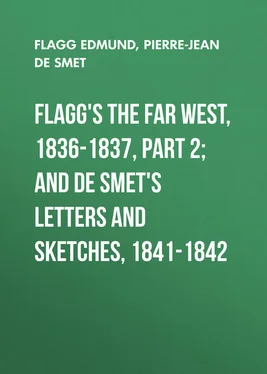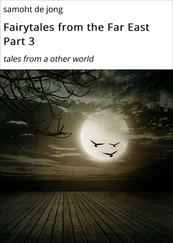Edmund Flagg - Flagg's The Far West, 1836-1837, part 2; and De Smet's Letters and Sketches, 1841-1842
Здесь есть возможность читать онлайн «Edmund Flagg - Flagg's The Far West, 1836-1837, part 2; and De Smet's Letters and Sketches, 1841-1842» — ознакомительный отрывок электронной книги совершенно бесплатно, а после прочтения отрывка купить полную версию. В некоторых случаях можно слушать аудио, скачать через торрент в формате fb2 и присутствует краткое содержание. Издательство: Иностранный паблик, Жанр: foreign_antique, foreign_prose, на английском языке. Описание произведения, (предисловие) а так же отзывы посетителей доступны на портале библиотеки ЛибКат.
- Название:Flagg's The Far West, 1836-1837, part 2; and De Smet's Letters and Sketches, 1841-1842
- Автор:
- Издательство:Иностранный паблик
- Жанр:
- Год:неизвестен
- ISBN:нет данных
- Рейтинг книги:4 / 5. Голосов: 1
-
Избранное:Добавить в избранное
- Отзывы:
-
Ваша оценка:
- 80
- 1
- 2
- 3
- 4
- 5
Flagg's The Far West, 1836-1837, part 2; and De Smet's Letters and Sketches, 1841-1842: краткое содержание, описание и аннотация
Предлагаем к чтению аннотацию, описание, краткое содержание или предисловие (зависит от того, что написал сам автор книги «Flagg's The Far West, 1836-1837, part 2; and De Smet's Letters and Sketches, 1841-1842»). Если вы не нашли необходимую информацию о книге — напишите в комментариях, мы постараемся отыскать её.
Flagg's The Far West, 1836-1837, part 2; and De Smet's Letters and Sketches, 1841-1842 — читать онлайн ознакомительный отрывок
Ниже представлен текст книги, разбитый по страницам. Система сохранения места последней прочитанной страницы, позволяет с удобством читать онлайн бесплатно книгу «Flagg's The Far West, 1836-1837, part 2; and De Smet's Letters and Sketches, 1841-1842», без необходимости каждый раз заново искать на чём Вы остановились. Поставьте закладку, и сможете в любой момент перейти на страницу, на которой закончили чтение.
Интервал:
Закладка:
For sixteen days was Col. Clarke employed in his march from Kaskaskia to Vincennes, after the capture of the military posts upon the Mississippi. At length, after toils incredible, he reached the Wabash. High upon the eastern bank, its base swept by the rolling flood, stood Fort Vincent, the British fortress, at that period garrisoned by a superior corps of soldiery, with an auxiliary force of six hundred Indian warriors, and under the command of a skilful officer, Gov. Hamilton. On the western bank was spread out a broad sheet of alluvion five miles in breadth, completely inundated by the swollen stream. After five days of toil this wilderness of waters was passed; the rolling current of the Wabash was crossed in the night, and the morning sun beheld these daring men before Vincennes. As they approached the town – history goes on to relate – over the broad and beautiful prairie upon which it stands, at the moment his troops were discovered by the enemy, Clarke found himself near a small ancient mound, which concealed part of his force from the foe. Under this covert he countermarched his men in so skilful a manner, that the leading files, which had been seen from the town, were transferred undiscovered to the rear, and made to pass again and again in sight of the enemy, until his whole force had several times been displayed, and his little detachment of jaded troops assumed the appearance of an extended column greatly superior to its actual strength. The garrison was promptly summoned to surrender, and, after a brief defence, Gov. Hamilton struck his flag to a body of men not half as powerful as his own. 59
Next in importance to Fort Chartres, of that chain of military posts commenced by the French in the Valley of the Mississippi, was Fort du Quesne; 60and of this celebrated fortress, so notorious in the bloody annals of border warfare, it may not be irrelevant, in concluding the present subject, to add a few sentences. This post was erected on that low tongue of land, at the head of the Ohio and confluence of the Alleghany and Monongahela rivers, where Pittsburgh now stands, commanded on all sides by lofty bluffs. It was built by M. de la Jonquier, at command of the Marquis du Quesne, governor of Canada. In 1754 the bold Contrecœur came down the Alleghany, with a thousand Frenchmen in canoes, and eighteen pieces of artillery; and, dispersing the small colonial force, intrenched himself upon the spot. This was the prologue to that bloody drama, the catastrophe of which deprived France of all her possessions east of the Mississippi. In 1758 Fort du Quesne was taken by Gen. Forbes; a more scientific and extensive fortress was erected on the spot, at an expense of sixty thousand pounds sterling, and, in honour of William Pitt, then Premier of England, named Fort Pitt. It is difficult to conceive what could have been the design of these commanders in erecting such a massive fortress on such a spot, unless to impress the minds of their savage but simple neighbours; for resistance to artillery planted upon the neighbouring heights would have been quite as vain as any attack of the Indians upon its walls with their primitive weapons. The same may be said of nearly all the early fortifications in the West, and of some of more modern date upon our frontier. Subsequently Fort Pitt came into the possession of our government as part of the estate of the Penn family, and is now only a heap of rubbish. Thus much for early military posts in the Valley of the Mississippi.
So deeply interested was I in listening to the "legendary lore" associated with the spot upon which I was sitting, that hours glided unobserved away, and the full moon was culminating in cloudless splendour from the zenith when we retired.
Early the following morning I was in the saddle. The heavy night-mists lay wavering, like a silvery mantle, all over the surface of that broad plain; and the crimson clouds, rolling up the eastern sky, proclaimed the rising sun. After a short ride I reached the former site of St. Philippe, a settlement of the French, since called Little Village . Its "common field" is now comprised in the single plantation of Mr. M'David. It was at this point that Philippe Francis Renault – from whom the village received its name, as well as a large section of the neighbouring region, known to this day as "Renault's Tract" – established himself in 1719, with two hundred miners from France, in anticipation of discovering gold and silver. 61He was disappointed; but is said to have obtained large quantities of lead from the region along the opposite bank of the Mississippi, in the vicinity of Ste. Genevieve; and to have discovered, moreover, a copper mine near Peoria. St. Philippe was once a considerable village. Previous to 1765 – when possession of the country was claimed by the English government, and, like the other French settlements, it was abandoned by the villagers – it is said to have comprised twenty or thirty families, a Catholic church, and a water-mill; while the surrounding meadow afforded pasturage for extensive herds of cattle.
Leaving St. Philippe, the winding pathway in a few miles had conducted me into the depths of a forest of gigantic cotton-trees upon the left, encircled by enormous grape-vines, and the ground beneath entangled by a wilderness of underbrush and thickets of wild fruit. In a few moments the forest opened unexpectedly before me, and at my feet rolled on the turbid floods of the Mississippi, beyond which went up the towering cliffs of limestone, hoar and ragged, to the sheer height of some hundred feet from the water's edge. They were the cliffs of Herculaneum, with their shot-towers. 62For the first time I discovered that I had mistaken my way. Perceiving the low log-cabin of a woodcutter among the trees, I had soon obtained the requisite information, and was retracing my steps; but a weary plod through the deep black loam, and the tall grass weltering in the night-dews, and the thickets of the dripping meadows, was anything but agreeable. There were but few farms along my route, and the tenants of those with whom I chanced to meet betrayed too plainly, by their ghastly visages, and their withered, ague-racked limbs, the deadly influences of the atmosphere they inhaled. As I wandered through this region, where vegetation, towering in all its rank and monstrous forms, gave evidence of a soil too unnaturally fertile for culture by man, whose bread must be bought by "the sweat of his brow," I thought I could perceive a deadly nausea stealing over my frame, and that every respiration was a draught of the floating pestilence. I urged onward my horse, as if by flight to leave behind me the fatal contagion which seemed hovering on every side; as if to burst through the poisonous vapours which seemed distilling from every giant upas along my path. That this region should be subject to disease and death is a circumstance by no means singular. Indeed, it seems only unaccountable to the traveller that it may be inhabited at all. A soil of such astonishing depth and fertility, veiled from the purifying influences of the sun by the rank luxuriance of its vegetation, in the stifling sultriness of midsummer sends forth vast quantities of mephitic vapour fatal to life; while the decay of the enormous vegetables poisons the atmosphere with putrid exhalations. Cultivation and settlement will, of course, as in the older states, remedy this evil to some extent in time. It is said that the southern border of a lake in this region is less unhealthy than the northern, on account of the prevalence of winds from the former quarter during the summer months; and that the immediate margin of a river, though buried in vegetation, is less liable to disease than the neighbouring bluffs, upon which hang the night and morning vapours. A dry and somewhat elevated spot is preferable to either for a cabin; and it should be well ventilated, and never closely surrounded by cornfields. The rank and massive foliage shields the earth from the sunbeams, which exhale its poisonous damps; and in its rapid growth, the plant abstracts from the surrounding atmosphere one of its vital ingredients. Indeed, most of the diseases peculiar to the West are superinduced by imprudence, ignorance, or negligence in nursing. Let the recent emigrant avoid the chill, heavy night-dews and the sickening sultriness of the noontide sun; provide a close dwelling, well situated and ventilated, and invariably wear thicker clothing at night than in the day, and he may live on as long and as healthily in the West as in his native village. Bilious intermittents are the most prevalent and fatal diseases in the sickly months of August, September, and October; and in the winter and spring pleurisies are frequent. The genuine phthisic, or pulmonary consumption of New-England, is rarely met. A mysterious disease, called the " milk sickness" – because it was supposed to be communicated by that liquid – was once alarmingly prevalent in certain isolated districts of Illinois. 63Whole villages were depopulated; and though the mystery was often and thoroughly investigated, the cause of the disease was never discovered. By some it was ascribed to the milk or to the flesh of cows feeding upon a certain unknown poisonous plant, found only in certain districts; by others, to certain springs of water, or to the exhalations of certain marshes. The mystery attending its operations and its terrible fatality at one period created a perfect panic in the settlers; nor was this at all wonderful. The disease appears now to be vanishing. But, of all other epidemics, the "fever and ague" is the scourge of the West. Not that it often terminates fatally, except by superinducing a species of consumption; but, when severe and protracted, it completely shatters the constitution; and, like Mezentius, the victim ever after bears about him a living death. In its lighter form, most of the settlers at some time or other experience it, as it is brought on by exposure: and when I consider that, during my ramble in the West, I have subjected myself to every variety of climate and circumstance; have been drenched by night-dews and morning-dews; by the vapours of marshes and forests, and by the torrents of summer showers; have wandered day after day over the endless prairies beneath a scorching sun, and at its close have laid myself anywhere or nowhere to rest; when I consider this, I cannot but wonder at the escape of a constitution naturally feeble from complete prostration. Yet never was it more vigorous than during this tour on the prairies.
Читать дальшеИнтервал:
Закладка:
Похожие книги на «Flagg's The Far West, 1836-1837, part 2; and De Smet's Letters and Sketches, 1841-1842»
Представляем Вашему вниманию похожие книги на «Flagg's The Far West, 1836-1837, part 2; and De Smet's Letters and Sketches, 1841-1842» списком для выбора. Мы отобрали схожую по названию и смыслу литературу в надежде предоставить читателям больше вариантов отыскать новые, интересные, ещё непрочитанные произведения.
Обсуждение, отзывы о книге «Flagg's The Far West, 1836-1837, part 2; and De Smet's Letters and Sketches, 1841-1842» и просто собственные мнения читателей. Оставьте ваши комментарии, напишите, что Вы думаете о произведении, его смысле или главных героях. Укажите что конкретно понравилось, а что нет, и почему Вы так считаете.












